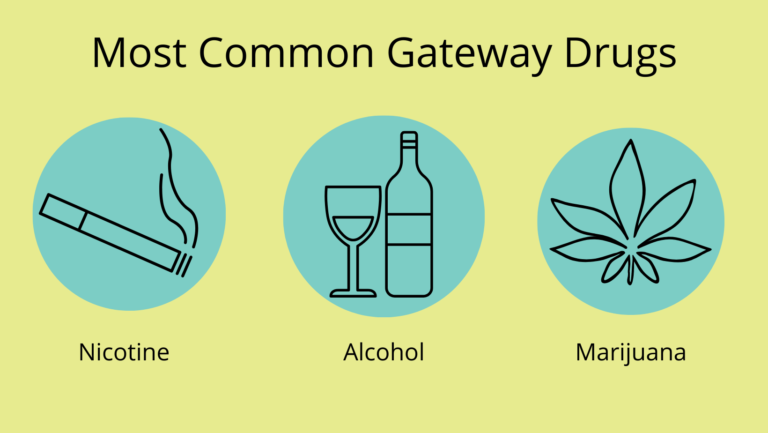What Is a Gateway Drug?
You might have heard the term “gateway drug” before when learning about addiction. Many consider alcohol, nicotine and marijuana to be substances that lead to the use of harder drugs, but there is some controversy surrounding this topic. Understanding the concept of a gateway drug, as well as the research behind the gateway drug theory, can help you recognize the risks associated with these substances.
About the Gateway Drug Theory
The Gateway Drug Theory argues that teens who experiment with substances like alcohol, tobacco and marijuana are more likely to abuse harder drugs like methamphetamine, cocaine and heroin. Denise Kandel is often credited with formulating the Gateway Drug Theory, as her research in the 1970s demonstrated that teens followed a specific sequence when beginning to experiment with substances. First, they consumed beer and wine before progressing to tobacco and hard liquor use. Next, teens began using marijuana, which was ultimately followed by hard drug use.
The 3 Common Gateway Drugs
Alcohol, nicotine and marijuana are often referred to as gateway drugs. This is because experts have concluded that they increase the risk for future use of harder drugs. However, there is still some debate on whether these substances truly act as gateway drugs.

Alcohol
Alcohol has received a great deal of attention because of its potential to be a gateway drug. Studies have shown that alcohol use at age 15 increases the risk that a person will inject drugs during adulthood, which does provide some evidence that alcohol is a gateway substance.
In addition, a study on U.S. 12th graders found that the majority of those who misused multiple substances consumed alcohol before beginning tobacco and marijuana use. Further, those who began drinking in sixth grade were at greater risk of abusing illegal drugs when compared to those who began drinking in ninth grade.
Nicotine
Nicotine has also been identified as a gateway drug, and there is some evidence to support this. In fact, numerous studies have shown that teens begin smoking prior to using illegal drugs. Further, research has shown that the majority of cocaine users were already cigarette smokers when they began using cocaine. There is also a higher risk of cocaine addiction among people who begin smoking cigarettes before starting cocaine use. This is compared to those who begin smoking after initiating the use of cocaine.
Marijuana
Marijuana is perhaps the substance most commonly labeled as being a gateway drug, and there is often controversy surrounding this label. Gateway drug statistics show that marijuana users are 2.79 times more likely to use illegal drugs. Further, a recent research report found that marijuana users are 2.76 times more likely to begin using opioids. They are also 2.52 times more likely to develop symptoms of opioid abuse or addiction.
Prescription Pills
Alcohol, tobacco and marijuana are typically referred to as the three gateway drugs, but prescription pills have also been labeled in this way. One study found that 80% of heroin users first abused prescription opioids before progressing to heroin use. This provides some evidence that certain prescription pills can be a gateway to harder drug use.
Dangers of Using Gateway Drugs
People may think that substances like alcohol, tobacco and marijuana are harmless, but there is evidence that these are gateway drugs for some people. Abusing these substances comes with risks that include addiction, overdose and other health concerns.
Addiction
Even though they are not considered “hard drugs,” substances like alcohol, tobacco and marijuana can lead to the development of addiction. Some people may experiment with these substances and never become addicted, but for those who do, addiction can create serious consequences and make it difficult to function in daily life.
Risk Factors for Developing an Addiction
Gateway drugs can increase the risk of abusing harder drugs or developing an addiction. However, many people who use alcohol, tobacco and marijuana do not develop addiction or progress to harder drug use. People who do become addicted are likely to have certain risk factors, such as:
A family history of addiction
Positive parental attitudes toward substance use
Lack of parental supervision
Mental health issues
Association with delinquent peers.
Overdose
People who misuse prescription opioids are at risk of overdose. This is because taking a large enough quantity of these drugs can slow or stop breathing and lead to coma, brain damage or death. People may think that prescription drugs are safe since they have legitimate medical uses, but they can still cause an overdose.
Risky Behavior
Misusing gateway drugs can lead to risky behavior, such as unprotected sex, dating violence and illegal activities. Using large quantities of substances also increases the risk of becoming injured. Additionally, using gateway drugs at a young age increases the risk of behaviors like fighting, carrying a weapon at school or getting in a car with an impaired driver.
Health Risks
Misusing substances also comes with health risks. For example, it is well known that smoking has a negative effect on health. Studies with teens have shown that cigarette smoking is associated with respiratory infections, poor lung development and increased risk of lung cancer. Research has also found that teens who drink or smoke are in worse health and are more likely to require an overnight hospital stay when compared to teens who do not use these substances.
Treatment for Substance Use or Addiction
If you have found that you are unable to stop using drugs despite significant consequences in your life, you may have a substance use disorder — the clinical term for addiction. When gateway drug use leads to addiction or the use of harder drugs, seeking treatment can help you develop the tools necessary for living a drug-free life.
There are multiple options available when seeking treatment for addiction. Many successful programs use a combination of therapy and medications. Treatment can occur on an outpatient basis, meaning you continue to live at home while attending appointments at a treatment facility or even online. You can also enroll in an inpatient program, which provides intensive treatment and requires you to live on-site at a rehab center.
Therapy for Addiction
If you’re looking for addiction treatment options, Nobu offers a free-to-download mental wellness app that features mindfulness training, lessons from mental health experts and a goal tracker so you can monitor your progress. Nobu also offers a paid option, which allows you to schedule online sessions with licensed counselors who can provide therapy services to help you overcome addiction. Download the Nobu app for free on the Apple Store or Google Play Store to get started.



Medically Reviewed by – Dr. Angela Phillips
Angela is a licensed therapist and clinical researcher, and has worked in public, private, government, and not-for-profit organizations, across clinical and research-oriented roles. Angela’s clinical and research experience has included suicide prevention, cognitive behavioral… Read more.
- Nkansah-Amankraa, Stephen; Minellib, Mark. “Gateway hypothesis and early drug use: Additional findings from tracking a population-based sample of adolescents to adulthood.” Preventive Medicine Reports, December 2016. Accessed June 23, 2022.
- Lynskey, Michael T. “Denise Kandel’s classic work on the gateway sequence of drug acquisition.” Addiction, October 2018. Accessed June 23, 2022.
- Barry, Adam E.; King, Jessica; Sears, Cynthia; Harville, Cedric; Bondoc, Irina; Kessy, Joseph. “Prioritizing Alcohol Prevention: Establishing Alcohol as the Gateway Drug and Linking Age of First Drink With Illicit Drug Use.” Journal of School Health, January 2016. Accessed June 23, 2022.
- Bovornkitti, Somchai. “Beyond Nicotine Gateway Hypothesis.” JOJ Internal Medicine, November 26, 2019. Accessed June 23, 2022.
- Taylor, Michelle. “Assessing the gateway hypothesis.” University of Bristol, 2016. Accessed June 23, 2022.
- Wilson, Jack; Mills Katherine; Freeman, Tom P.; Sunderland, Matthew; Visontag, Rachel; Marel, Christina. “Weeding out the truth: a systematic review and meta-analysis on the transition from cannabis use to opioid use and opioid use disorders, abuse or dependence.” Addiction, February 2022. Accessed June 23, 2022.
- National Institute on Drug Abuse. “What are prescription opioids?” June 1, 2021. Accessed June 23, 2022.
- Centers for Disease Control and Prevention. “High-Risk Substance Use Among Youth.” October 22, 2020. Accessed June 23, 2022.
- Park, Sang-hee. “Smoking and adolescent health.” Korean Journal of Pediatrics, October 2011. Accessed June 23, 2022.
- Johnson, Patrick; Richter, Linda. “The relationship between smoking, drinking, and adolescents’ self-perceived health and frequency of hospitalization: analyses from the 1997 National Household Survey on Drug Abuse.” Journal of Adolescent Health, March 2002. Accessed June 23, 2022.
- National Institute on Drug Abuse. “The Science of Drug Use and Addiction: The Basics.” July 2, 2018. Accessed June 23, 2022.